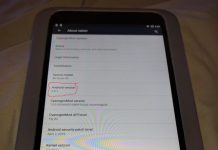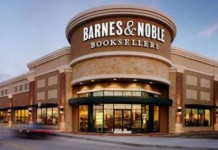 Poor Barnes & Noble has been taking a real beating in the e-reader blog space lately, so I thought I’d share a link to a recent Mashable story that actually offers a bit of positive B&N and Nook news. The lede graph of reporter Lauren Indvik’s piece tells the rather unfortunate financial B&N story we’ve been reading about everywhere over the past few days:
Poor Barnes & Noble has been taking a real beating in the e-reader blog space lately, so I thought I’d share a link to a recent Mashable story that actually offers a bit of positive B&N and Nook news. The lede graph of reporter Lauren Indvik’s piece tells the rather unfortunate financial B&N story we’ve been reading about everywhere over the past few days:
“Sales of Barnes & Noble’s line of tablets and e-readers declined in the company’s fiscal 2013 first quarter ending July 28, the bookseller reported Tuesday.”
But then, there’s this:
“[Barnes & Noble’s] digital content sales increased 46%. That was enough to make up for shrinking income from devices, which suffered lower average selling prices and production scaling issues — particularly for the Nook GlowLight B&N released in April, the company said. Collectively, total revenues for B&N’s Nook unit which includes digital content and accessories as well as hardware, amounted to $192 million, just $1 million more than it brought in during the comparable period last year.”
Indvik, of course, isn’t one to sugarcoat the truth:
“Hardware sales were bad in B&N’s last fiscal quarter, too. The company reported that it was forced to sell its devices at a lower margin to compete with Amazon’s Kindle lineup. Holiday sales of some devices — in particular, its $139 Nook Simple Touch E-Ink reader — were so poor that the company was forced to buy back inventory. E-readers were also returned in unexpectedly high numbers after the holidays, the company said.”
And yet, Indvik also makes a point of playing by the objective journalistic rule of presenting both sides of a story:
“Those numbers may seem bad at first glance,” she writes, “but remember that Amazon takes a loss on sales of its Kindle Fire tablet and E-Ink e-readers, as well. For now, at least, B&N’s digital content sales are covering that loss.” (Emphasis ours. —Ed.)
Interesting, no?
So before we continue bashing Barnes & Noble into the proverbial wall, let’s try to remember the incontrovertible fact that numbers and statistics can essentially be skewed to represent almost anything we want them to. The Nook, for instance, is probably never going to achieve the overall popularity or sales numbers of Amazon’s Kindle. But does that necessarily mean their business plan is flawed, or that their digital division is a crash-and-burn failure?
The truth is … I don’t really know. And unless you happen to be holding an upper-management position with the B&N corporate office, neither do you. And that’s more or less the point.
Don’t get me wrong: I enjoy the fine art of business speculation as much as the next guy; it can make for interesting conversation, to be sure. But if you’re going to use a bunch of subjective online articles and blog posts (this one included!) to base your B&N arguments on … well, just don’t.
That is all.


































Great post. I love B&N (and my Nook) and wish the Company the best.
I honestly can’t imagine that B&N, Amazon or Kobo has a future selling ereading devices for a profit. Ultimately, if dedicated ereaders continue to exist as a stand alone product, they are going to become like basic calculators, so cheap that it makes sense to give them away.
The future is going to be, as always content. I might buy one ereader every other year, but I will probably buy a minimum of 10-15 ebooks every year (I read a lot more but try to read a fair bit of public domain and freebies to keep my costs down). So in the long run, where is the money going to be?
Thanks for the comment, Bill. As far as your thoughts about content being king, I’d say you’re absolutely right. No matter what the medium, platforms have always changed, and I would suspect they’ll continue to change. But good content is ultimately what drives all of them.
As for e-readers eventually becoming as cheap as basic calculators: Maybe, but I don’t personally see that happening, because I don’t see e-readers lasting long-term as stand-alone devices. I think we’ll start to see more people using phones as tablets–or more likely, some as-yet-unknown combination of the two–to handle their reading. My guess is that in 10 years or so, there will be two major e-reader brands (like Coke and Pepsi, say), and a handful of smaller, scrappier start-ups. But ultimately, who knows?
As much as I like e-ink, the future probably lies in some form of 7″ form factor tablet. Touch eink readers now run about $100 and are highly capable — Kobo, Kindle or Nook — and can be sold for a profit. They are great to read on, easy to carry and reasonably durable with fantastic battery life. There may be a medium term future for these and they serve as a gateway to the prospective vendor’s store.
But clearly the 7″ colour tablet, at about $200 and despite the trade-offs (price, battery life, weight) are far more capable. I challenge the claim these are being sold “below cost”. The ASUS Google Nexus 7 tablet is the most advanced of its kind on the market and not tied to a bookstore to subsidise its sale for ASUS.
It’s true numbers can be manipulated to tell a good story but it doesn’t mask the challenges for Barnes and Noble. They are a financial mess. At the current stock price, the company is valued at $700 million. Yet Liberty Media and Mirosoft have pumped $500 million into the company in the past 12 months and Microsoft is committed to handing over another $330 million in advance royalties over the next five years.
The problem is the Nook division is losing vast amounts of money; the college division “breaks even” and only the retail division makes any money. This is not a new situation and current management has not fixed the problem despite several years of trying. Even when its arch rival, Borders, closed all 700 of its stores, the net improvement for B&N retail was a few percent in sales.
There is definitely room for more players than Kindle but, within english reading countries, it’s hard to imagine room for four, five or six players. B&N has strong roots in the US and ought to continue to defend and expand that turf and not be distracted by foreign adventures that management is ill-equipped to execute. It would be nice to extend to Canada; expanding internationally online to select markets might be profitable; but setting up retail markets outside the US without a partner to bear the brunt of the risk is beyond B&Ns capabilities and risks bringing down the only profitable part of the operation, the 691 US retail bricks and mortar stores.
I own an iPad, but I would much rather read long-form fiction on my e-ink device (an old Sony 505). My wife bought a Nook with Glowlight a few months ago and it’s a really nice product. It’s disappointing to hear that it’s not performing better in the marketplace. I’m underwhelmed with Sony’s newer offering, so when my PRS-505 finally dies I’ll probably get one of those snazzy Nooks like my wife. Hopefully B&N can turn things around.
There’s an awful lot of spin going on there. “Digital content sales increased 46% … enough to make up for shrinking income from devices,” is true only in the sense that total sales for 1Q2013 are virtually identical to total sales for 1Q2012. Zero growth over the year. Also, that 46% increase in digital content sales apparently is part of a rising tide lifting all boats, because B&N continues to claim that they have 25-30% of the e-book market, which is what they’ve been claiming all along for the past couple of years. Again, zero growth.
More telling is the lack of profitability. The NOOK division continues to lose money at the rate of about a quarter billion dollars per year (EBITDA), as it has for the past two years. That isn’t chump change. In the most recent quarter — 1Q2013, reported just a couple of days ago — B&N lost $56.7 million on NOOK, an 11% increase in losses over 1Q2012. In contrast, the bookstore division reported an 88% increase in year-over-year EBITDA profit to $74.6 million.
The big picture: failure to achieve any progress in the NOOK Division over the past two years. Overall sales are unchanged. Market share is unchanged. Losses are worsening. And every quarter and every year, the NOOK Division turns B&N’s corporate profit into a corporate loss.
If the NOOK Division were making money instead of losing it, this stasis might be tolerable. But losing a quarter billion a year, with no improvement in sight…
Then there’s the prospect of having to sell e-books below-cost in order to compete with Amazon if the proposed settlements in DoJ v. Apple et al are approved. If that happens, B&N’s smart move is to shut down the NOOK business. Not that I really expect them to make the smart move.
[I’m a NOOK owner and very much want to see NOOK succeed. That doesn’t blind me to the figures that say that NOOK isn’t succeeding and isn’t making any progress toward success.]
@Preston
Actually the Nook Glowlight did too well. B&N was not able to deliver enough of them to satisfy demand, and that way lost potential sales.
2013?
I’m a fan of Barnes and Noble. I love my Nook Color (and have gadget envy for the Nook Tablet). I’m excited about Microsoft’s investment and B&N’s recent announcement that they’ve taken the Nook and Nook reading to England. That said, my Nook sales are approximately 10% of my Kindle sales (I love my Kindles also). Our industry needs competition and B&N is a critical part of that but we can’t ignore that fact that B&N has a rough row to hoe if they’re going to succeed against a tough competitor like Amazon. I sure hope they continue to grow.
Rob Preece
StaHi: B&N’s fiscal years currently run May to April. Fiscal years are numbered based on the calendar year that they end in. So 1Q2013 is May-July, 2012.
In B&N’s case, their fiscal years are 52 or 53 weeks long, so rarely even start and end exactly at the beginning or end of the month. B&N officially defines their fiscal year as ending on the “Saturday closest to the last day of April.”
As a voracious ebook reader (and buyer) living in Australia, I don’t understand why B&N don’t sell to the majority of English-speakers, who live outside the U.S..
I keep checking back to see if there’s a Nook app available to me yet, but nope.
I’d buy your ebooks guys, but you don’t want my money.